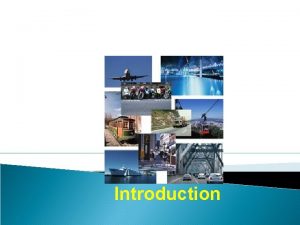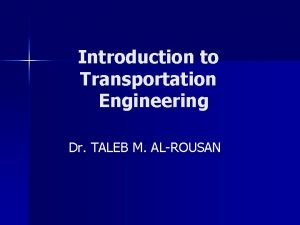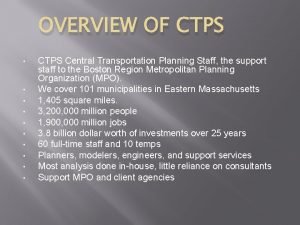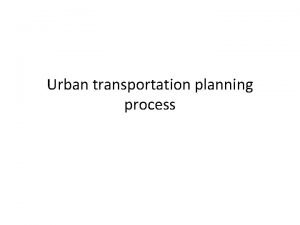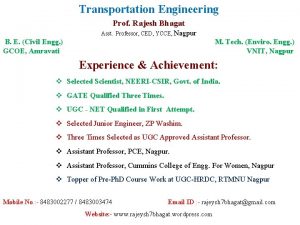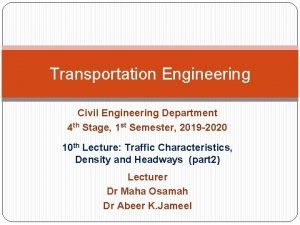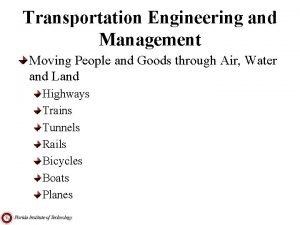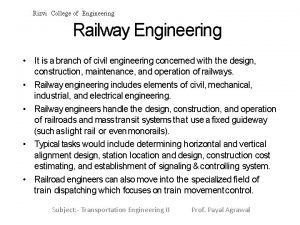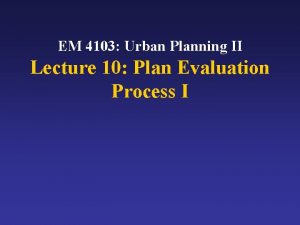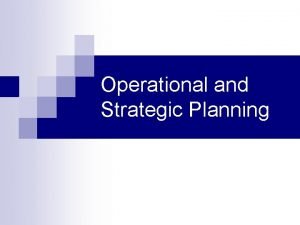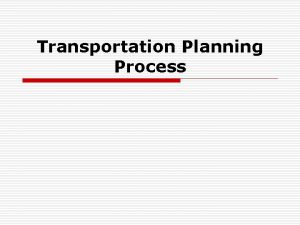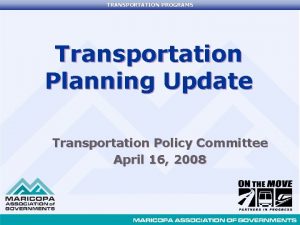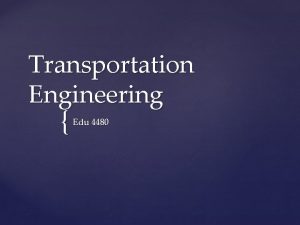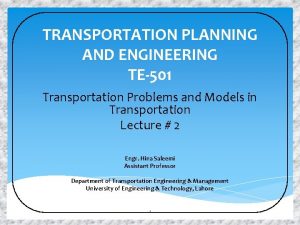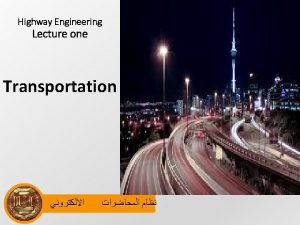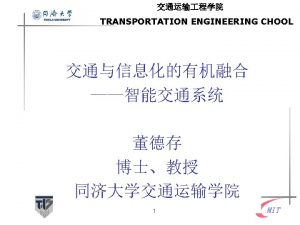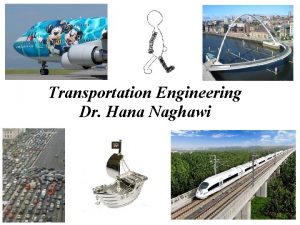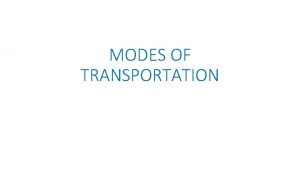Transportation Engineering I Introduction Definition of Transportation Planning
















- Slides: 16

Transportation Engineering - I Introduction

Definition of Transportation Planning Transportation planning provides the information, tools, and public involvement needed for improving transportation system performance Transportation planning is a continuous process that requires monitoring of the system’s performance and condition

Transportation Planning Affects… Policies Choices among alternative strategies Priorities Funding allocations

Transportation Planning Process The transportation planning process almost always involves the following six steps (in some form or another): 1. Identification of goals/objectives (anticipatory planning) or problems (reactive planning) 2. Generation of alternative methods of accomplishing these objectives or solving these problems 3. Determination of the impacts of the different alternatives 4. Evaluation of different alternatives 5. Selection of one alternative 6. Implementation

Transportation Engineering Transportation engineering is a sub-discipline of civil engineering which deals with the application of technology and scientific principles to the planning, functional design, operation and management of facilities for any mode of transportation in order to provide the safe, rapid, comfortable, convenient, economical, and environmentally compatible movement of people and goods (transport). The planning aspects of transport engineering relate to urban planning, and involve technical forecasting decisions and political factors. Transportation engineering, as practiced by civil engineers, primarily involves planning, design, construction, maintenance, and operation of transportation facilities

Pavement Engineering Pavement engineering is an engineering discipline which involves the design, construction and maintenance of Roads & Systems, urban streets as well as parking facilities. Important aspects of Pavement engineering include overall planning of routes, financing, environmental impact evaluation, and value engineering to compare alternatives.

Traffic Engineering Traffic engineering involves planning for the volumes of traffic to be handled, the methods to accommodate these flows, the lighting and signing of highways, and general layout. Older techniques include signs, signals, markings, and tolling. Newer technologies involve intelligent transportation systems, including advanced traveler information systems (such as variable message signs), advanced traffic control systems (such as ramp meters), and vehicle infrastructure integration.

Railway Engineering It is a branch of civil engineering concerned with the design, construction, maintenance, and operation of railways. Railway engineering includes elements of civil, mechanical, industrial, and electrical engineering. Railway engineers handle the design, construction, and operation of railroads and mass transit systems that use a fixed guideway (such as light rail or even monorails). Typical tasks would include determining horizontal and vertical alignment design, station location and design, construction cost estimating, and establishment of signalling & controlling system. Railroad engineers can also move into the specialized field of train dispatching which focuses on train movement control.

Port and Harbor Engineering Port and harbor engineers handle the design, construction, and operation of ports, harbors, canals, and other maritime facilities. A harbor (or haven) is a place for ships to enter and find shelter from storms or other natural phenomena. The modern harbor is a place where ships are built, launched, and repaired, as well as a terminal for incoming and outgoing ships. There are four principal classes of harbors; commercial, naval, fishery, and refuge for small craft. Harbor may be natural or artificial.

Airport Engineering Airport Engineering encompasses the planning, design, and construction of terminals, runways, and navigation aids to provide for passenger and freight service. Airport engineers design and construct airports. They must account for the impacts and demands of aircraft in their design of airport facilities. These engineers must use the analysis of predominant wind direction to determine runway orientation, determine the size of runway border and safety areas, different wing tip to wing tip clearances for all gates and must designate the clear zones in the entire port.

TRANSPORT NETWORK MEANS OF TRANSPORT LAND ROADWAYS RAILWAYS WATER PIPELINES INLAND WAYS AIR OVERSEAS WAYS DOMESTIC AIRWAYS INTERNATIONAL AIRWAYS PUBLIC UNDERTAKING PRIVATE AIRLINES

The Role of Transport Network in the development 1. 2. 3. 4. 5. 6. Lifelines of the Country. Transportation Turning of local market into national market Help in the development of economy National integration of the country Cultural integration

Highway Transportation Engineering Definition The application of technology and scientific principles to the planning, functional design, operation, and management of roads, streets and highways, their networks, terminals, abutting lands, and relationships with other modes of transportation. Areas of highway transportation engineering: ◦ Planning of streets and highways ◦ Geometric design of road facilities ◦ Traffic operations and control ◦ Traffic safety ◦ Maintenance of road facilities and controls

History of Road Construction

Roman Road Construction Basic cross section

Impact of Transportation Economic Development Social Development Spatial Development Cultural Development Political Development
 Definition of transportation engineering
Definition of transportation engineering Transportation engineering definition
Transportation engineering definition Aggregate planning for services
Aggregate planning for services Central transportation planning staff
Central transportation planning staff Urban transportation planning process
Urban transportation planning process Transportation engineering
Transportation engineering Transportation engineering by rajesh bhagat
Transportation engineering by rajesh bhagat Transportation engineering
Transportation engineering Transportation engineering
Transportation engineering Railway engineering
Railway engineering Strategic planning vs tactical planning
Strategic planning vs tactical planning Planning balance sheet in urban planning
Planning balance sheet in urban planning Role segmentation workforce planning
Role segmentation workforce planning Inactivism planning
Inactivism planning Perencanaan kapasitas dan agregat
Perencanaan kapasitas dan agregat Long medium and short term planning in primary schools
Long medium and short term planning in primary schools What is language planning
What is language planning
